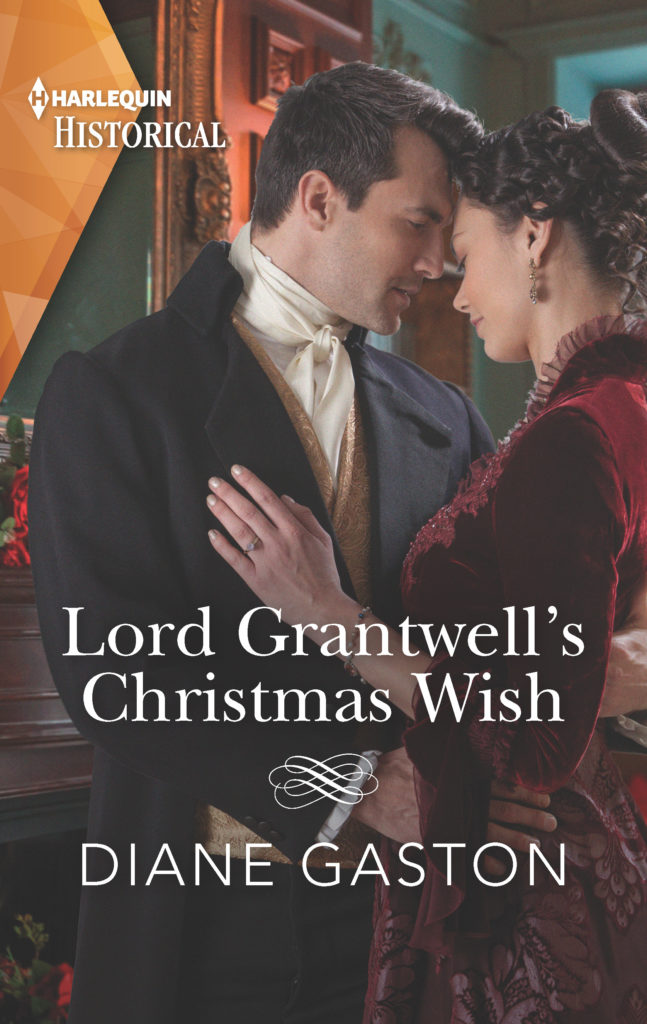
In researching Lord Grantwell’s Christmas Wish I came across some new-to-me Regency Christmas traditions. I’ve blogged about Regency Christmases before, like here at Risky Regencies in 2016, when Bound By a Scandalous Secret was a December release.
I mentioned things like Regency households did not have Christmas trees or send Christmas cards. Santa Claus came later, as did singing Silent Night. They did exchange gifts, decorate with winter greenery, and have special Christmas food. You can read the whole blog here.
Lord Grantwell’s Christmas Wish was set in Yorkshire, so a couple of new traditions popped up in my research.
The first was a tradition involving the lighting of the yule log. To bring good luck, a large log was brought in on Christmas eve to burn constantly in the hearth until it has completely burned itself out. Before supper, when the yule log is burning, all other lights are extinguished, everyone is silent, and the youngest one present must light two special candles from the yule log while everyone makes a wish. The wish must be kept secret or it will not come true. In my book it is Anna, the youngest of Lord Grantwell’s wards who lights the candles. And, of course, along with everyone else, Lord Grantwell makes his wish.
Another Yorkshire tradition I discovered took place on Christmas morning. For more good luck, on Christmas morning, before anything was taken out of the house, something green must be brought in, usually a leaf from an evergreen. Grant charges Anna and her brother William with this task.
Did you know there were different versions of The Wassail Song? Even though I was not absolutely sure the Wassail Song was sung in the Regency, I played upon the differences.
Here’s an excerpt from the book:
“You are forgetting something, m’lord,” Thompson said.
“Forgetting something?” He was puzzled. “What?”
“The wassailing song,” Thompson said.
Anna’s face fell. “I do not know the wassailing song.”
“No?” Grant touched her cheek. “We will sing it for you.” He began and the servants joined in:
We’ve been a-while a-wandering,
Amongst the leaves so green.
But now we come a wassailing,
So plainly to be seen.
For it’s Christmas time, when we travel far and near,
May God bless you and send you a happy New Year….
He paused. “Miss Pearson, why are you not singing?”
She shook her head. “That is not the song I know.”
“That is the wassail song,” he insisted.
“No,” she countered with a smile. This is the wassailing song.
She sang:
Here we come a-wassailing
Among the leaves so green;
Here we come a-wand’ring
So fair to be seen.
Love and joy come to you,
And to you your wassail too;
And God bless you and send you a Happy New Year
And God send you a Happy New Year…
“No. No. No,” he protested. The words were slightly different. The tunes were slightly different. He led the servants in the second verse:
We are not daily beggars,
That beg from door to door,
But we are neighbors children,
Whom you have seen before…
Lillian stopped them. “That is the third verse,” she said. “Here is the second.”
Our wassail cup is made
Of the rosemary tree,
And so is your beer
Of the best barley.
He joined her in singing the refrain—his refrain along with hers, and they all continued singing verses with identical lyrics, Lillian’s differing version making a sort of harmony while the refrains sung together became a jumble.
He and the others ended the song, but she kept singing. One last verse.
Her singing slowed and she held her gaze on his:
God bless the master of this house
Likewise the mistress too,
And all the little children
That round the table go.
When she mentioned children she walked over to William and Anna and put her arms around them. Grant joined them as they sang the refrains one last time with the children trying to join in.
And God send you a Happy New Year…“
Here’s the Yorkshire version:
Here’s Lillian’s more familiar version:
Love and Joy come to all of you from the Riskies….and to you your wassail, too!
